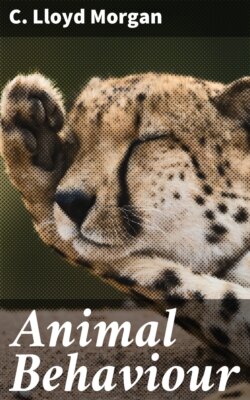Читать книгу Animal Behaviour - C. Lloyd Morgan - Страница 17
На сайте Литреса книга снята с продажи.
IV.—The Evolution of Consciousness
ОглавлениеTable of Contents
The origin of consciousness, like that of matter or energy, appears to be beyond the pale of scientific discussion. The appearance of effective consciousness on the scene of life does indeed seem to justify the belief in the prior existence of sentience as the mere accompaniment of organic behaviour. Ex nihilo nihil fit. And since effective consciousness must, on this principle, be developed from something, it is reasonable to assume that this something is pre-existing sentience. Again, we may assume that this sentience is a concomitant of all life-processes, or only of some. But we have no criterion by which we can hope to determine which of these alternatives is the more probable.
We appear, however, at all events to have evidence that when effective consciousness does enter on the scene and play its part in the guidance of behaviour, its progress is, in technical phraseology, marked by that differentiation of conscious elements, and that integration of these differentiated items, which are seemingly the correlatives of the differentiation and integration of nervous systems. There is thus, presumably, a progressive development of orderly complexity in the conscious situations of which controlled or guided behaviour is the outcome. And when this has reached a certain stage—what stage it is most difficult to determine—the relationships, at first implicit in the conscious situations, as they naturally arise in the course of experience, begin to be rendered explicit with the dawn of reflection. Intentional abstraction and generalization to which data are afforded by the reiterated emphasis in experience of the salient features in successive situations, supply new elements to the more highly developed situations of rational life. Ideal schemes and plans of action, the products of reflection and foresight, take form in the mind and enter into the conscious situation. And the intelligent animal, hitherto the creature of impulse, guided only by the pleasurable or painful tone which gives colour to experience, becomes a rational being, capable of judging how far his own behaviour and that of others is conformable to an ideal.
If, then, we were asked to characterize in the briefest possible terms the stages of conscious evolution, we should say that in the first stage we have consciousness as accompaniment; in the second, consciousness as guide; in the third, consciousness as judge. And if we were pressed to apply distinctive terms to these three, we should adopt St. George Mivart’s term consentience for the mid-phase, and speak of mere sentience in the first stage; consentience in the second; and consciousness, with restricted signification, in the third and highest stage. Such a distinction in terms is, however, a counsel of perfection, and we shall not attempt to preserve it in the following pages, in which the word “consciousness” will be used in a comprehensive sense.
Ever since the publication of Darwin’s “Origin of Species,” evolutionists have been divided into two sections where consciousness in the narrower sense is under discussion. The members of the one have contended that, though the physical and perhaps the lower mental nature of man is the outcome of evolutionary process, his higher mental attributes are of other origin. The members of the second section have urged that the higher not less than the lower characteristics of the mind of man have been evolved. It is somewhat strange that naturalists who accept the latter position are not infrequently impatient when any serious attempt is made to discuss it from the standpoint of psychology. It is, however, becoming more and more clearly evident that the discussion of the relation of the animal to the human mind, if it is to be made a subject of scientific inquiry, must be conducted on psychological lines by those who have devoted years of study to the subject. In this work such a discussion will be attempted, and animal behaviour will be treated as the precursor of human conduct, and as affording evidence of the germs from which the distinctively human mental attributes may have been evolved.
